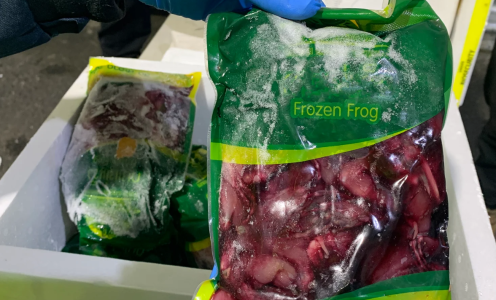What Was Hidden Inside 62,000kg of Thai Food That Landed This Woman in Jail?
By
Gian T
- Replies 1
Australia is famous for its strict biosecurity laws—and for good reason! Our unique wildlife, thriving agriculture, and even our backyard veggie patches depend on keeping out pests and diseases that can hitch a ride from overseas. But every so often, someone tries to sneak something dodgy past our border controls, and the results can be downright shocking.
Recently, a woman found herself behind bars after authorities uncovered a jaw-dropping 62,000 kilograms of exotic foods smuggled into Australia from Thailand. But this wasn’t just a case of someone trying to bring in a few extra snacks for a family barbecue. Hidden inside mislabelled polystyrene boxes, border agents discovered a veritable smorgasbord of illicit goods—some of which you’d never expect to see on your local menu.
Among the haul? Frozen frogs (yes, you read that right), prawns, pork, and fresh produce crawling with insects. All of it was destined for Sydney’s black market, but the plan was foiled thanks to a tip-off from a confidential source. If these boxes had slipped through the cracks, the consequences could have been catastrophic—not just for our dinner plates, but for the entire country.
Why is this such a big deal? Let’s break it down:
Frogs: More Than Just a Jumping Concern
Frogs might seem harmless, but they can carry chytridiomycosis, a deadly fungal disease that’s already wiped out or endangered over 500 amphibian species worldwide. Introducing infected frogs to Australia could devastate our native frog populations, with ripple effects throughout the ecosystem.
Prawns: A Viral Threat
Imported prawns can harbour white spot disease, a highly contagious virus that’s already caused havoc in prawn farms overseas. An outbreak here could cripple our seafood industry and threaten the livelihoods of countless Aussies.
Pork: A Pandora’s Box of Problems
Pork from overseas can carry diseases like African swine fever—a nightmare scenario for our pig farmers. Australia has so far managed to keep this and other devastating illnesses at bay, but one slip-up could change everything.
Insects: Tiny Invaders, Massive Impact
The produce in those boxes wasn’t just fresh—it was infested. Invasive insects are notoriously hard to control once they get a foothold. Just look at the varroa mite, which has hammered our honey industry, or fire ants, which are steadily marching down the east coast. Over in Perth, the shot-hole borer has already killed thousands of trees and crippled the local plant trade.
The Law Comes Down Hard
Australia doesn’t mess around when it comes to biosecurity. Breaching these laws can land you with fines up to $1.6 million and a decade in jail. In this case, the woman behind the 62,000kg importation scheme was sentenced to two years in prison and ordered to complete 150 hours of community service. She was convicted of nine counts against the Biosecurity Act—a clear message that authorities take these threats seriously.
Justine Saunders, Deputy Secretary of Biosecurity at the Department of Agriculture, Fisheries and Forestry (DAFF), summed it up: 'Australia is free from many of the pests, weeds and diseases that impact agricultural productivity and the environment in other parts of the world. Our biosecurity officers work tirelessly to keep these pests out. Illegal activity can undermine Australia's animal, plant and human health status and our excellent global reputation.'
Why Should We Care?
It’s easy to take Australia’s clean, green reputation for granted. But the truth is, we’re an island nation surrounded by potential threats. Our farmers, gardeners, and even our beloved native animals rely on strong borders and vigilant authorities. One careless act—or one deliberate crime—can have consequences that last for generations.
What Can You Do?
If you’re travelling overseas or ordering goods from abroad, always declare what you’re bringing in. If you see something suspicious, don’t hesitate to report it. And remember, those strict rules at the airport aren’t just there to annoy you—they’re protecting everything we love about Australia.

Have you ever had a close call with customs, or do you remember a time when a pest or disease made headlines in your community? Share your stories and thoughts in the comments below! Let’s keep the conversation going and help protect our beautiful country for generations to come.
Read more: Aussie companies caught red-handed—government warns of ‘full force of the law’
Recently, a woman found herself behind bars after authorities uncovered a jaw-dropping 62,000 kilograms of exotic foods smuggled into Australia from Thailand. But this wasn’t just a case of someone trying to bring in a few extra snacks for a family barbecue. Hidden inside mislabelled polystyrene boxes, border agents discovered a veritable smorgasbord of illicit goods—some of which you’d never expect to see on your local menu.
Among the haul? Frozen frogs (yes, you read that right), prawns, pork, and fresh produce crawling with insects. All of it was destined for Sydney’s black market, but the plan was foiled thanks to a tip-off from a confidential source. If these boxes had slipped through the cracks, the consequences could have been catastrophic—not just for our dinner plates, but for the entire country.
Why is this such a big deal? Let’s break it down:
Frogs: More Than Just a Jumping Concern
Frogs might seem harmless, but they can carry chytridiomycosis, a deadly fungal disease that’s already wiped out or endangered over 500 amphibian species worldwide. Introducing infected frogs to Australia could devastate our native frog populations, with ripple effects throughout the ecosystem.
Prawns: A Viral Threat
Imported prawns can harbour white spot disease, a highly contagious virus that’s already caused havoc in prawn farms overseas. An outbreak here could cripple our seafood industry and threaten the livelihoods of countless Aussies.
Pork: A Pandora’s Box of Problems
Pork from overseas can carry diseases like African swine fever—a nightmare scenario for our pig farmers. Australia has so far managed to keep this and other devastating illnesses at bay, but one slip-up could change everything.
Insects: Tiny Invaders, Massive Impact
The produce in those boxes wasn’t just fresh—it was infested. Invasive insects are notoriously hard to control once they get a foothold. Just look at the varroa mite, which has hammered our honey industry, or fire ants, which are steadily marching down the east coast. Over in Perth, the shot-hole borer has already killed thousands of trees and crippled the local plant trade.
The Law Comes Down Hard
Australia doesn’t mess around when it comes to biosecurity. Breaching these laws can land you with fines up to $1.6 million and a decade in jail. In this case, the woman behind the 62,000kg importation scheme was sentenced to two years in prison and ordered to complete 150 hours of community service. She was convicted of nine counts against the Biosecurity Act—a clear message that authorities take these threats seriously.
Justine Saunders, Deputy Secretary of Biosecurity at the Department of Agriculture, Fisheries and Forestry (DAFF), summed it up: 'Australia is free from many of the pests, weeds and diseases that impact agricultural productivity and the environment in other parts of the world. Our biosecurity officers work tirelessly to keep these pests out. Illegal activity can undermine Australia's animal, plant and human health status and our excellent global reputation.'
Why Should We Care?
It’s easy to take Australia’s clean, green reputation for granted. But the truth is, we’re an island nation surrounded by potential threats. Our farmers, gardeners, and even our beloved native animals rely on strong borders and vigilant authorities. One careless act—or one deliberate crime—can have consequences that last for generations.
What Can You Do?
If you’re travelling overseas or ordering goods from abroad, always declare what you’re bringing in. If you see something suspicious, don’t hesitate to report it. And remember, those strict rules at the airport aren’t just there to annoy you—they’re protecting everything we love about Australia.
Key Takeaways
- A woman has been jailed for two years and ordered to serve 150 hours of community service after trying to illegally import 62,000kg of exotic foods, including frozen frogs, prawns, infested produce, and pork, from Thailand to Sydney’s black market.
- The massive haul posed significant biosecurity risks, as undeclared foreign goods like frogs, prawns, and pork can carry devastating diseases not present in Australia, and infested produce can introduce invasive insects.
- Authorities intercepted the shipment thanks to a tip-off, preventing threats to local wildlife, agriculture, and the environment, and highlighted that breaches carry penalties of up to $1.6 million in fines and 10 years’ jail.
- Australia’s biosecurity officers work tirelessly to protect the country’s unique animal, plant, and human health status, with illegal imports risking severe consequences for agriculture and the nation’s global reputation.
Read more: Aussie companies caught red-handed—government warns of ‘full force of the law’








